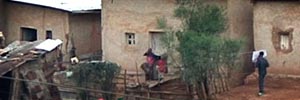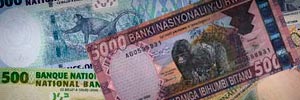Pressures on a fragile society
When a society is already fragile, unpredictable events can mean the difference between survival and tragedy.
In the ten years before the 1994 genocide, Rwanda was facing pressure from many directions: crop failures, loss of income and wars in neighbouring countries. For the increasingly unpopular Hutu regime, it was becoming an impossible situation…
Between a rock and a hard place
In 1990 rebel Tutsi troops - the early Rwandan Patriotic Front - moved from Uganda into northern Rwanda to make war on the Hutu Rwandan army.
At the same time, other countries were putting pressure on the Hutu regime to become more democratic: to share power with other groups including the Tutsi RPF, and to organise free elections.
Publicly, President Habyarimana was forced to compromise and negotiate with the opposition. Privately, however, he continued to finance and organise the extremist Hutu militia.
The context of war

Alphonse Hitiyaremye, Rwandan farmer.
In 1990 rebel Tutsi troops – this was the early Rwandan Patriotic Front – marched out of the Ugandan bush to make war on the Hutu Rwandan army, opening a new phase in the conflict.
All genocides in modern history have occurred in the midst of war – not because they were its cause or consequence but because war suspends the rule of law: it systemises death, normalises savagery, fosters fear and delusion, reawakens old demons, and unsettles morality and human values. It undermines the last psychological defences of the future perpetrators of the genocide. The farmer Alphonse Hitiyaremye summed it up in his own way: “War is a dreadful disorder in which the culprits of genocide can plot incognito”
From A time for machetes. The killers speak by Jean Hatzfeld
The French connection

“In February 1993… the RPF moved towards Kigali and might have seized the city had French troops not intervened on the side of the government. The French had long supported Habyarimana and had no wish to see him driven from power by the rebels.
The pro-Habyarimana faction in Paris was led by Francois Mitterrand's son Jean-Christophe, who saw Rwanda as part of a Francophone Africa under threat from the encroachments of the English-speaking nations to the north and east, i.e. Uganda and Tanzania. Among Jean-Christophe's gifts to the Rwandan president was the personal jet that was shot out of the sky on 6 April.
The implication of this friendship was clear: if the price for maintaining some degree of French influence was the preservation of despots and kleptocrats, then Paris was always more than willing to pay.
From Season of Blood. A Rwandan Journey
< previous page | next page >
Real differences
Hutu and Tutsi
A history of conflict
THE POLITICS OF RACISM
Colonialism
A messy power shift
Refugees and scapegoating
Cheap tricks
Preparing for genocide
INSIGHTS
Pressures
In the villages
STORIES
My friend the killer




